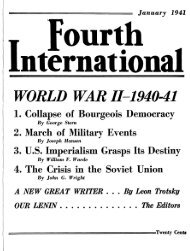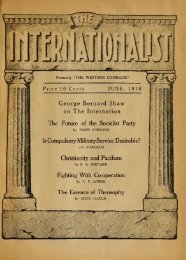The Stalin school of falsification - Marxists Internet Archive
The Stalin school of falsification - Marxists Internet Archive
The Stalin school of falsification - Marxists Internet Archive
Create successful ePaper yourself
Turn your PDF publications into a flip-book with our unique Google optimized e-Paper software.
<strong>Stalin</strong> School <strong>of</strong> Falsification - Chapter 5<br />
Congress, summarizing the trade union discussion:<br />
"<strong>The</strong> Workers' Opposition said: 'Lenin and Trotsky will unite.' Trotsky taking the floor replied: 'Whoever<br />
does not understand that it is necessary to unite is going against the party; <strong>of</strong> course, we will unite<br />
because we are party men.' I supported Trotsky. To be sure, Trotsky and I have differed. When more or<br />
less equal groupings arise in the Central Committee, the party decides, and decides in such a way that we<br />
unite according to the will and directives <strong>of</strong> the party. That is the announcement with which Trotsky and<br />
I went to the Miners' Congress and have come here, i.e., to the Party Congress."(Ibid., p.132.)<br />
Is that anything like the spiteful scribbling which is given out these days for a history <strong>of</strong> the trade union<br />
discussion in one political textbook after another?<br />
<strong>The</strong> thing becomes laughable when Bukharin incautiously proceeds to exploit the trade union discussion<br />
as a weapon against "Trotskyism." Here is the way Lenin appraised Bukharin's position in that<br />
discussion:<br />
"Hitherto the 'chief' in the struggle has been Trotsky. But now Bukharin has left him way behind and<br />
completely eclipsed' him. Bukharin has created a completely new situation in the struggle for he has<br />
talked himself into a mistake a hundred times bigger than all the mistakes <strong>of</strong> Trotsky put together.<br />
"How could Bukharin talk himself into this break with communism? We know all the s<strong>of</strong>tness <strong>of</strong><br />
comrade Bukharin, one <strong>of</strong> the characteristics for which you love him so, and can't help loving him. We<br />
know that he is <strong>of</strong>ten jokingly called 's<strong>of</strong>t wax.' It seems that 'any unprincipled person,' any 'demagogue,'<br />
can print on that s<strong>of</strong>t wax anything he wants to. <strong>The</strong> harsh expression included in the quotation marks<br />
was used by comrade Kamenev in the discussion <strong>of</strong> January 17. And he had a right to use it. But, <strong>of</strong><br />
course, it would never occur to Kamenev or to anybody else to explain what happened as unprincipled<br />
demagogy-to reduce everything to that."(Ibid., p.35.)<br />
THE THIRD CONGRESS OF THE COMINTERN<br />
33. After all, was the trade union question the only question in the life <strong>of</strong> the party and the Soviet<br />
Republic during the years <strong>of</strong> my collaboration with Lenin? In the same year, 1921, the year <strong>of</strong> the Tenth<br />
Party Congress, occurred the Third World Congress <strong>of</strong> the Comintern, which played an enormous role in<br />
the history <strong>of</strong> the international labor movement. At this Third Congress, a pr<strong>of</strong>ound struggle unfolded<br />
upon the fundamental questions <strong>of</strong> communist policies. That struggle was transferred into our Political<br />
Bureau. I told something <strong>of</strong> it briefly at a session <strong>of</strong> the Political Bureau soon after the Fourteenth Party<br />
Congress:<br />
"<strong>The</strong>re was danger at that time that the policy <strong>of</strong> the Comintern would follow the line <strong>of</strong> the March 1921<br />
events[21] in Germany. That is, the attempt to create a revolutionary situation artificially-to 'galvanize'<br />
the proletariat, as one <strong>of</strong> the German comrades expressed it. That mood was the prevailing one in the<br />
Congress. Vladimir Ilyich came to the conclusion that, following this course, the International would<br />
most certainly go to smash. Before the Congress I wrote my impression <strong>of</strong> the March events to comrade<br />
Radek in a letter <strong>of</strong> which Vladimir Ilyich knew nothing. Considering the ticklish situation, and not<br />
knowing the Opinion <strong>of</strong> Vladimir Ilyich and knowing that Zinoviev, Bukharin and Radek were in general<br />
for the German Left, I naturally did not express myself publicly but wrote a letter (in the form <strong>of</strong> theses)<br />
to comrade Radek, asking him to give me his Opinion. Radek and I did not agree. Vladimir Ilyich beard<br />
about this, sent for me, and characterized the situation in the Comintern as one involving the very<br />
http://www.marxists.org/archive/trotsky/works/1937-st2/sf05.htm (7 <strong>of</strong> 20) [06/06/2002 15:06:23]

















